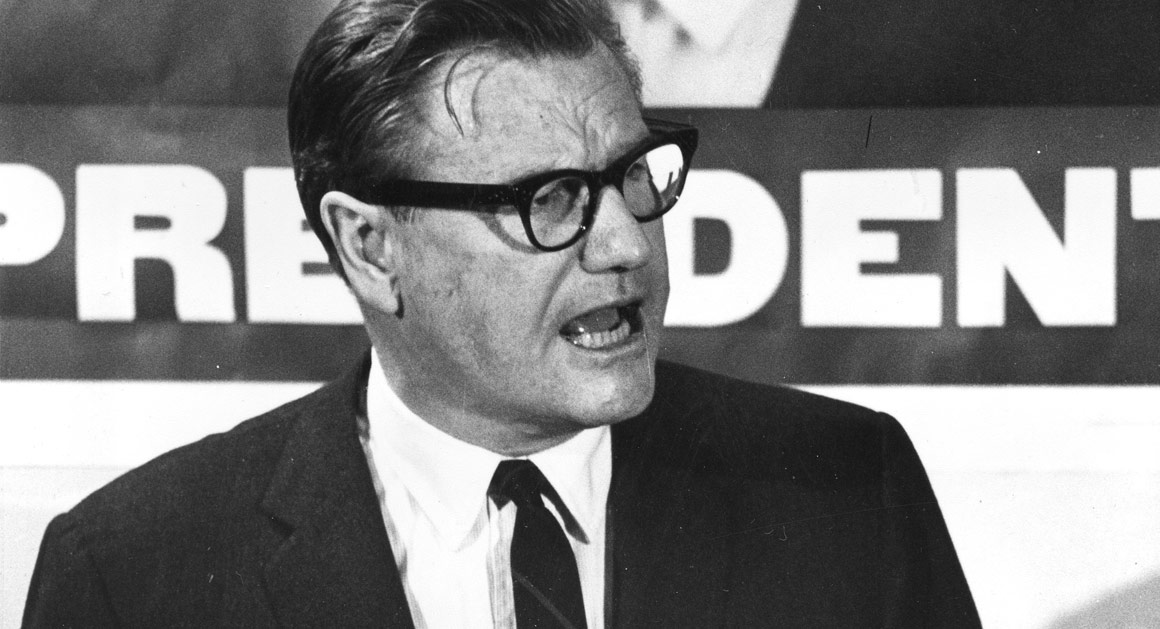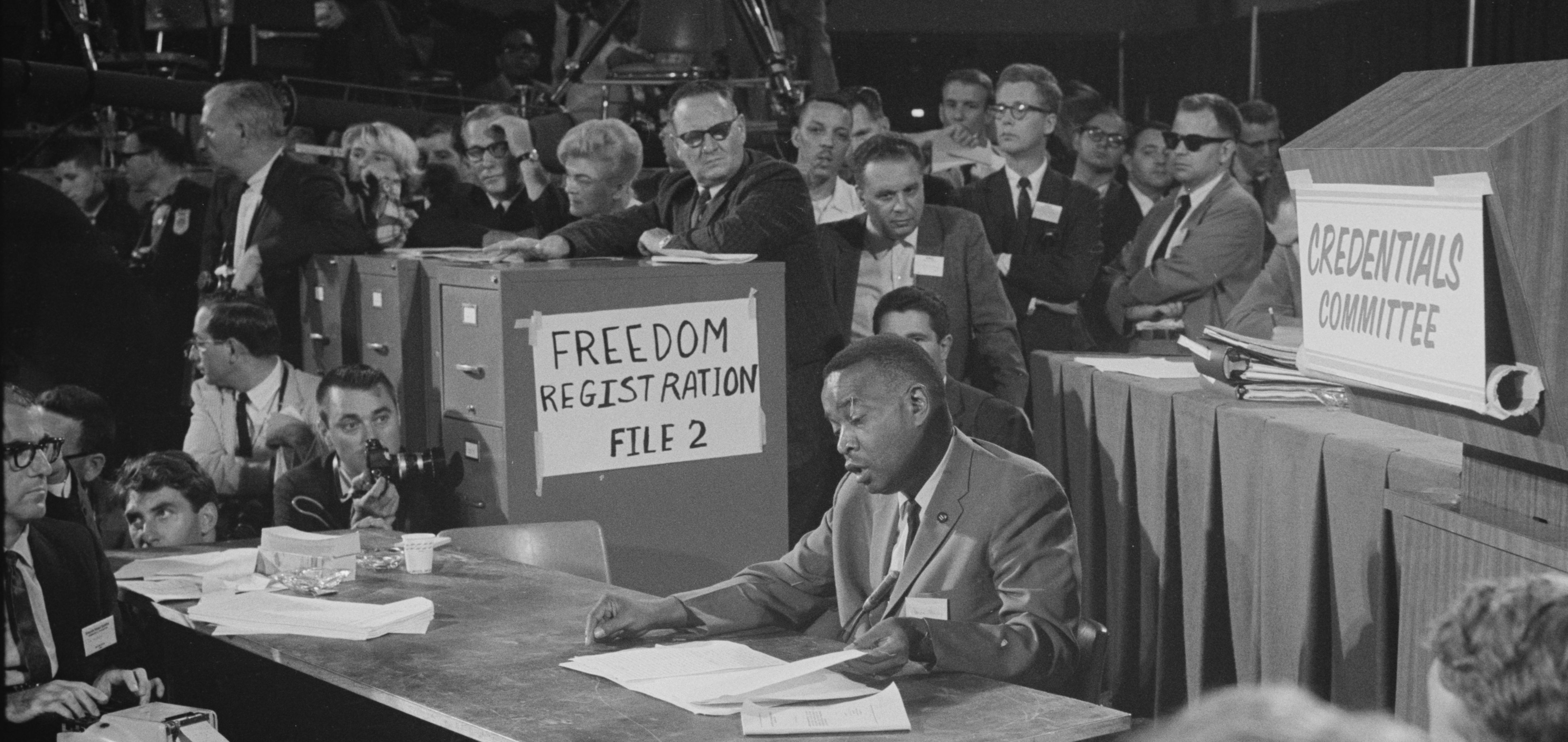
New York Governor Nelson Rockefeller pushing back against extremism at the 1964 Republican National Convention
In 1948 a young Democrat from Minnesota, Hubert Humphrey, boldly spoke to delegates at his party’s national convention and challenged the Democrats’ embrace of segregation. He called his party out and set the tone for what would be a career championing civil rights. It was a courageous move, and in retrospect, a dangerous one as the Democratic Party was the home of the most virulent racists of that era. However, the courage of Humphrey and the likes of civil rights attorney and labor leader Joseph Rauh enabled the drafting of a strong civil rights plank that was adopted into the Democratic Party platform and set the stage for later civil rights victories. While many grimace at the hateful and divisive rhetoric of Donald Trump, Rudy Giuliani and other Republicans of current day, they aren’t even in the league of a James O. Eastland, Strom Thurmond, and George Wallace and other Dixiecrats of the mid-20th century. What is missing today is the courage of a Hubert Humphrey and the moral conviction to recast the nation in a form aligned with the bold proclamations of freedom and individual rights made in Philadelphia in 1787.
We have before us the politics of marginalization. It is built upon fear and loathing, coded hate speech and deception. American politics has never been honorable but in the past it had some honorable individuals who deplored injustice and took principled stands intended to expand the boundaries of citizenship. In present day America there is no evidence of that type of bravado; the unapologetic demand that the nation honors its constitutional promise.

Aaron Henry making the case for Black voting rights at the 1964 Democratic National Convention
This political convention season is a stark contrast to the revolutionary stand of Humphrey in ’48 and the upheaval both parties faced in 1964. For Democrats that year, coming off the assassination of President John F. Kennedy, that tragedy would not be allowed to extinguish the demands of Blacks for representation at the convention and the call for voting rights. In Atlantic City that summer, it was the voices of Black Mississippians and the courage of their convictions that had Humphrey, labor leader Rauh and others seeking a way to crack the segregationists hold on the party. What is lost in our national memory is that in San Francisco that summer, as Republicans gathered to nominate their presidential candidate, a similar battle was brewing. As Senator Barry Goldwater led a conservative takeover of the G.O.P., including the political conversion of Ronald Reagan, he was facing opposition from the party’s moderate wing led by New York Governor Nelson Rockefeller. Given the party’s stinging loss to Kennedy in 1960, after capturing 32 percent of the Black vote, it was a courageous move by Rockefeller to try to push the party back to the center. In retrospect, Republicans like Rockefeller, New York Senator Jacob Javitz and New Jersey Senator Clifford Case would be considered progressive in today’s poisonous political environment.
What we lack today is a leadership that sees beyond the next election. We have created a professional brand of politician, more invested in their self-interest (their personal employment security) than systemic change, and more likely to compromise on principle rather than bear the burden of a truth- sayer. It is why many have come up dissatisfied with the choices presented in 2016, leaving the public engaged in a classic taste test of ‘less filling or tastes great.’ Voting seems to be a chore; making a selection out of fear or embracing an ominous view of the future that threatens to cast a shadow upon the land. The motivation on one side is to hold harmless while on the other to embrace the fears born from generations of guilt and paranoia. The voices of courage are buried deep in the graveyard of American politics.
We see an assault on voting rights in some of the states of the Confederacy but nary a word championing full voting rights; despite the striking down of the Section 5 provision of the Voting Rights Act of 1965 that enabled government monitoring of states with a history of disfranchisement. There is a cowardliness in the failure of political leadership to truthfully confront police brutality and the disproportionate dispensation of injustice toward Black Americans. What we have on one side is hate induced blindness and on the other side a preoccupation with trying not to offend. Despite all the data on racial profiling, the excessive use of force upon Blacks, and the crib to prison pipeline, the waffling by so-called progressives exposes the limits of their consciousness. By creating a false choice of supporting police or justice, progressives stumble from their fear of substantive change. Truth has become the kryptonite to justice
It’s not that the nation needs some Quixotic personalities, but simply some courageous souls who will not play to the lowest common denominator, pander to moneyed interests or see a detour around justice as their only route to power. After the balloons have dropped from the rafters in Cleveland and Philadelphia, and delegates slog their way home, we will be left with the same courage deficit we have experienced for decades. The real question is how long will a public aligned with justice and demanding change continue to settle for less.

today in black history
April 26, 2024
South Africa held its first all-race election in 1996, with almost 23 million voters casting ballots over four days.
Convention Watch: A Lack of Courage
POSTED: July 21, 2016, 9:00 am





















